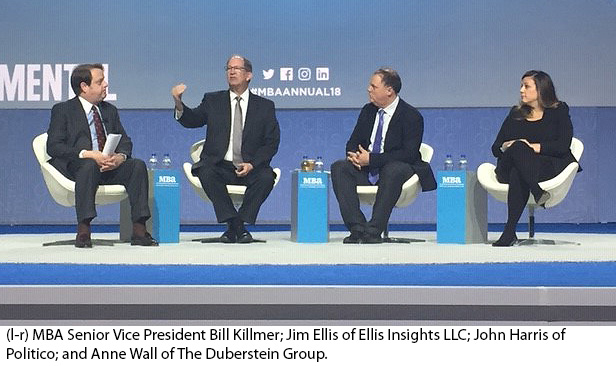
The Intersection of Politics and Policy at the Mid-Term
WASHINGTON, D.C.–Nearly two years into the Trump Administration–and with mid-term elections just three weeks away–the Nation’s Capital is seemingly at a political crossroads.
“Attempts to influence real estate finance policy in Washington continue at a brisk pace,” said Bill Killmer, Senior Vice President of Legislative and Political Affairs with the Mortgage Bankers Association, here at the MBA Annual Convention & Expo. “Those decisions continue to influence how your business might be managed in the face of a shifting market. Despite the ongoing political dysfunction, the laundry list of issues regulators and legislators could act upon in the coming months remains substantial.”
 Being as such here in Washington, MBA had no problem assembling a panel of pundits and analysts to discuss the intersection of policy and politics heading into the 2018 mid-term elections and outline key race outcomes that could affect the real estate finance industry’s priorities.
Being as such here in Washington, MBA had no problem assembling a panel of pundits and analysts to discuss the intersection of policy and politics heading into the 2018 mid-term elections and outline key race outcomes that could affect the real estate finance industry’s priorities.
Jim Ellis, Senior Political Analyst with the Business-Industry Political Action Committee and Publisher of Ellis Insight LLC, said despite speculation that the House and Senate could shift back to Democratic Party control, the odds of it happening in the Senate were not likely. With more seats to defend this cycle, Democrats would have to win 14 of 17 contested races.
“The most likely scenario is that the Republicans pick up a couple of seats in the Senate,” Ellis said.
The House is a different situation, Ellis said. More than 60 House seats are “in play,” he said, and the Democrats need only win 24 of those races to take control. “The Democrats have a real opportunity to take over the House,” he said.
Governors’ races, Ellis noted, “are extremely important from a federal and state perspective. It’s the mirror image of the Senate–the Republicans are defending a huge amount of seats and the races are very volatile. And it’s important because from a redistricting standpoint, whoever is in office has the power to approve–or veto–any redistricting plans that take place in 2020.”
John Harris, Co-founder and Editor-in-Chief of Politico, agreed. “The 2010s represented a ‘lost decade’ for Democrats,” he said. “I don’t think people truly appreciate how devastating the 2010 elections were for Democrats, when so many states fell into Republican control and allowed them to redraw the districts in such a way that it set back the Democrats for an entire decade.”
Harris warned that the 2018 elections could sound a strong warning to the GOP. “The Republican Party cannot continue to be the party of the older Americans and expect to remain relevant,” he said.
Anne Wall, Partner with The Duberstein Group, said the political discourse has become increasingly inflammatory, but political fundamentals remain sound. “What has changed in the political discourse is the means in which we get our information and how we absorb it,” she said.
Wall noted it’s become increasingly difficult to move issues forward, such as GSE reform. “Over time, the margins you see for compromise and discussion have been shrinking,” she said. “The result has been fewer legislative outcomes.”
“We are polarized, but relative to other events in history we are not that polarized,” Harris noted. “Dick Cheney might have disagreed with Patrick Leahy, but he didn’t try to cane him on the Senate floor.”
Wall said housing finance reform should be a key issue in the new Congress, regardless of which party is in power. “The open question is, ‘what’s the effort and the political appetite to take it on?'” she said. “And the relationship between the agencies and Congress is going to be very interesting, especially if Congress flips.”
Wall also noted that “earmarks,” which had largely disappeared over the past few years, could make their way back into the political conversation. “Earmarks can be an effective tool for solving political issues,” she said. “Removing earmarks turned legislation into a do-or-die issue that made it easy for many members of Congress to stop negotiating.”
Wall also said technology issues, such as blockchain, “are one of the most profound issues confronting Congress.” She noted most members of Congress understand that regulating technology can be problematic. “It’s important for policymakers get as smart as possible about these issues and stay as nimble as possible.”
Harris said looking forward, information and social media will become increasingly important in politics. “We thought Barack Obama was brilliant for harnessing the power of Facebook–and then Donald Trump harnessed the power of Twitter,” he said.
